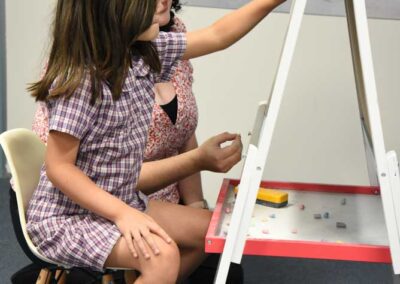Thumb-sucking is a normal part of early childhood and initially it may have seemed harmless. However, as time goes on, you may start to wonder about the potential consequences of this behaviour. Is it just a phase or could it be causing long-term issues? In this blog, we’ll delve into why prolonged thumb-sucking can be problematic and what you can do to help.
Is thumb-sucking normal?
First of all, it’s important to understand that thumb- and finger-sucking in babies is completely normal, and in fact, sucking often begins in the womb. It’s a fantastic self-soothing tool that babies use to comfort and settle themselves. Thumb-sucking triggers the release of hormones such as dopamine, serotonin, and endorphins, which make the baby feel comfortable and secure.
When should a child stop sucking their thumb?
Thumb-sucking usually stops at around 3 to 4 years of age. At this age children develop other ways to self-regulate and calm themselves and they don’t need to rely on thumb-sucking to be able to settle. However, some children continue to suck their fingers or thumbs well into their primary, or even high school years.
Why does this matter?
For many children, thumb- and finger-sucking doesn’t cause ongoing issues, but for others it does. This depends on how often the child sucks their thumb, the angle of their thumb in their mouth and how hard they suck. These are some of the potential ramifications of prolonged thumb-sucking.
-
- Dental problems: Prolonged thumb-sucking can cause dental misalignment, leading to issues such as an overbite, open bite or protruding front teeth (overjet). The pressure exerted by the thumb can affect the alignment of the teeth and the development of the jaw, potentially requiring orthodontic treatment later.
-
- Formation of the palate: Thumb-sucking can also influence the formation of the roof of the mouth (palate). Prolonged and intense thumb-sucking can exert pressure on the palate, causing it to become narrow and high arched. This in turn, results in overcrowding of the teeth, as there’s not enough room for the teeth to grow into.
- Speech and swallowing: When a child sucks their thumb, the tongue is in a low and forward position. This can contribute to the development of a tongue thrust – a swallowing pattern where the tongue moves forward and pushes against or between the teeth, as well as a lisp – where speech sounds (such as ‘s’ and ‘z’) are said with the tongue too far forward.
- Social stigma: As children grow older, thumb-sucking can become a source of embarrassment and social stigma, especially if peers notice and comment on the habit. This can impact your child’s self-esteem and social interactions.
- Oral infections: If your child is not regularly washing their hands, thumb- or finger-sucking may introduce dirt and bacteria into the mouth, which may cause infections in the gums or in a tooth.
How Can You Help Your Child Break the Habit?
Breaking the habit of thumb-sucking involves patience, understanding and gentle encouragement. Here are some strategies that you can try:
- Positive Reinforcement: Praise your child when they refrain from thumb-sucking, offering verbal encouragement and rewards for their efforts.
- Identify Triggers: Pay attention to the situations or emotions that trigger thumb-sucking in your child. Encourage alternative coping mechanisms, such as offering a favourite toy or engaging in a different activity to distract them.
- Create Awareness: Talk to your child about the potential consequences of thumb-sucking in a gentle and age-appropriate manner. Help them understand why it’s important to break the habit.
- Provide Support: Offer comfort and reassurance to your child as they work to break the habit. Avoid punishment and shaming, as this can create more stress and anxiety.
- Consult a Professional: Consider talking to your dentist, orthodontist or speech pathologist for guidance and support. Orofacial myologists have specialised training and can help support eliminating this habit and correct the tongue resting position.

Consider the Timing
As thumb-sucking is an effective self-soothing strategy, you should consider what is going on in your child’s life before tackling this habit. If it’s a highly stressful time or there are big changes happening, it may not be the right time to remove thumb-sucking. If your child struggles to regulate their emotions, you may also want to consider seeking support from a psychologist or occupational therapist.
Conclusion
While thumb-sucking is a common behaviour in young children, prolonged thumb-sucking can have lasting implications for your child’s oral health, speech development, and self-esteem. Breaking the habit takes time and patience. Be supportive, celebrate progress and reassure your child that you’re there to help them every step of the way.
For more information have a look at these resources:










